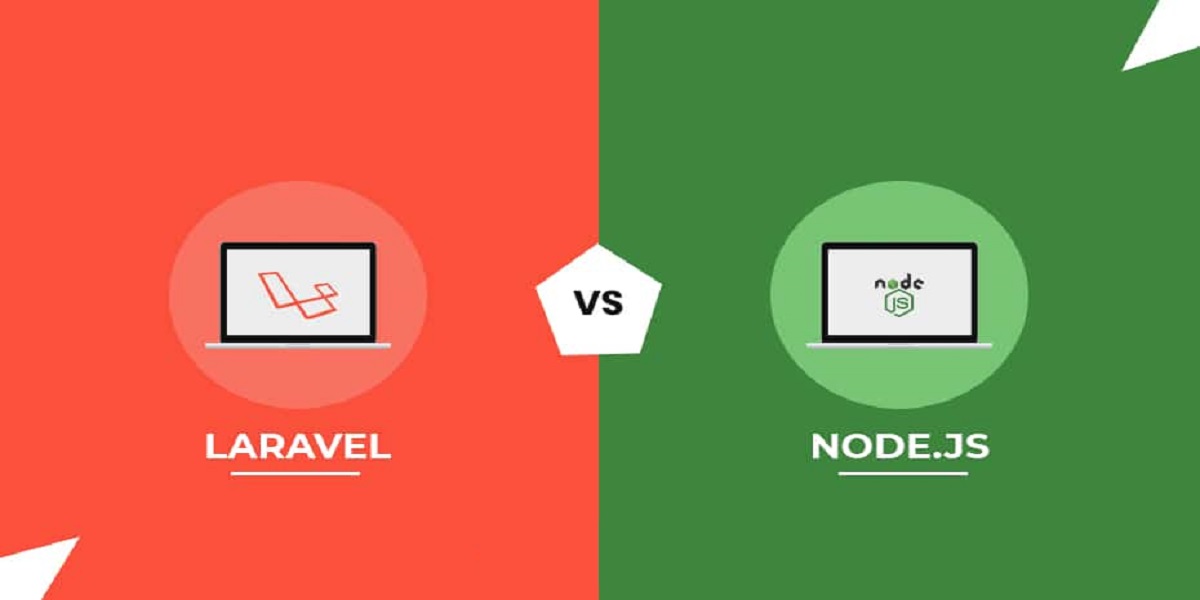
Coding can be tricky to manage, technology is progressing to address this fundamental issue. Various web frameworks have gained popularity among developers, promising to make the development process simple and straightforward.
However, the advent of two sturdy and advanced frameworks, Laravel and NodeJS, has been defined by their collection of unique capabilities to handle a specific development difficulty.
In this blog, we have compared the two but before stepping ahead let's begin with the introduction of Node & Laravel.
What is Node?
Node is an open-source and cross-platform server-side runtime environment. Built-in JavaScript programs for OS X, Microsoft Windows, and Linux are available within the Node runtime. It also comes with a large number of JavaScript modules that make building web apps with Node a lot easier. JavaScript can now do a lot more than just make websites dynamic.
Pros of Node
Easy Scalability
Developers will find it simple to scale applications both horizontally and vertically. By adding more nodes to the existing system, the applications can be grown horizontally.
Easy to learn
JavaScript is one of the most widely used programming languages, thus most front-end engineers are familiar with it. It's easier to learn Node.js, and it takes less time to work with it.
High Performance
Google's V8 JavaScript engine compiles JavaScript code directly into machine code. This makes it easier and quicker to put the code into action. The runtime environment improves code execution performance by providing non-blocking I/O operations.
Highly Extensible
Node.js is known for being extremely extensible, which means that you may tweak and extend it to meet your specific needs. JSON can also be used to create a framework for data exchange between the web server and the client. It also has APIs for constructing HTTP, TCP, and DNS servers, among other features.
What is Laravel?
Taylor Otwell designed Laravel, which is a free and open-source PHP web framework. It's a Symfony-based framework for creating MVC-style web apps. To aid in the building of web applications, Laravel makes use of pre-existing components from numerous frameworks. The resulting web application is more well-organized and practical.
Laravel is a PHP framework that combines the essential components of PHP frameworks such as CodeIgniter and Yii with other programming languages such as Ruby on Rails. Laravel application development services are safe and secure, and they can withstand a wide range of cyberattacks.
Pros of Laravel
Great Documentation
Each version of the framework comes with detailed and easy-to-understand documentation, including descriptions of classes, techniques, and code types.
Faster Development Cycle
For most developers, this is a huge selling factor. Because the integrations are much faster with Laravel, the entire development cycle can be significantly reduced. If you get lost, there's a large Laravel user community out there, so you'll have a decent chance of finding all the answers to your problems.
Artisan
Laravel includes an integrated command-line interface called Artisan.
Developers can use Artisan to create skeleton code. It also manages the database system, removing the need for developers to perform basic programming chores.
Eloquent ORM
With eloquent ORM, you may have a seamless Active Record implementation to work with the database. To put it another way, this Laravel feature allows you to design models that correlate to a database table. Built relationships are stored in the ORM, which means that if you modify the table, the related data will change as well.
Simplified Email Integration System
You can utilize Mandrill, Amazon SES, Sendmail, and other drivers with Laravel. Emails can be sent using both cloud-based and local services.
Comparison between Node & Laravel
Scalability and performance
Node delivers exceptional scalability and performance due to its asynchronous and non-blocking programming properties. This allows developers to implement functionality while simultaneously managing many events.
Scalability issues arise when Laravel developers start creating and building different versions of the application. Furthermore, it falls short of the other two frameworks in terms of performance.
Learning Curve
If you're familiar with JavaScript, you'll have no trouble learning Node.
However, because of the framework's asynchronous programming, developers find it challenging to code.
Laravel, on the other hand, has a more difficult learning curve. It does, however, come with good documentation and a range of tools to help developers grasp this PHP framework, such as Laracasts.
Rapid Advancement
Node works nicely on most PCs due to its lightweight server. It can also do a wide range of tasks with ease. Laravel has a slower development speed than the other two frameworks.
Architecture
Node works on the event-driven programming model. In this situation, the entire design is depending on user input, events, and communications from other apps.
Laravel follows the MVC pattern. It has been the chosen option of many developers due to its easy and realistic syntax.
Both Laravel and Node frameworks offer their own set of features and capabilities. The goals you specify for your project will decide which framework you use. You can hire dedicated Node JS developers or Laravel developers for your projects.
